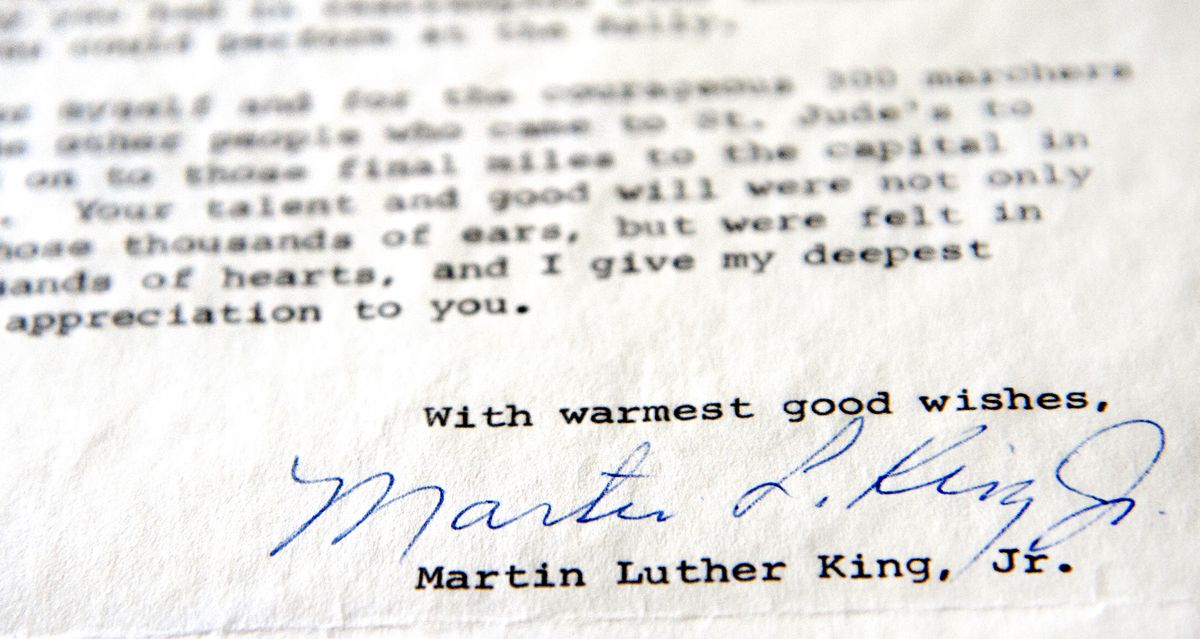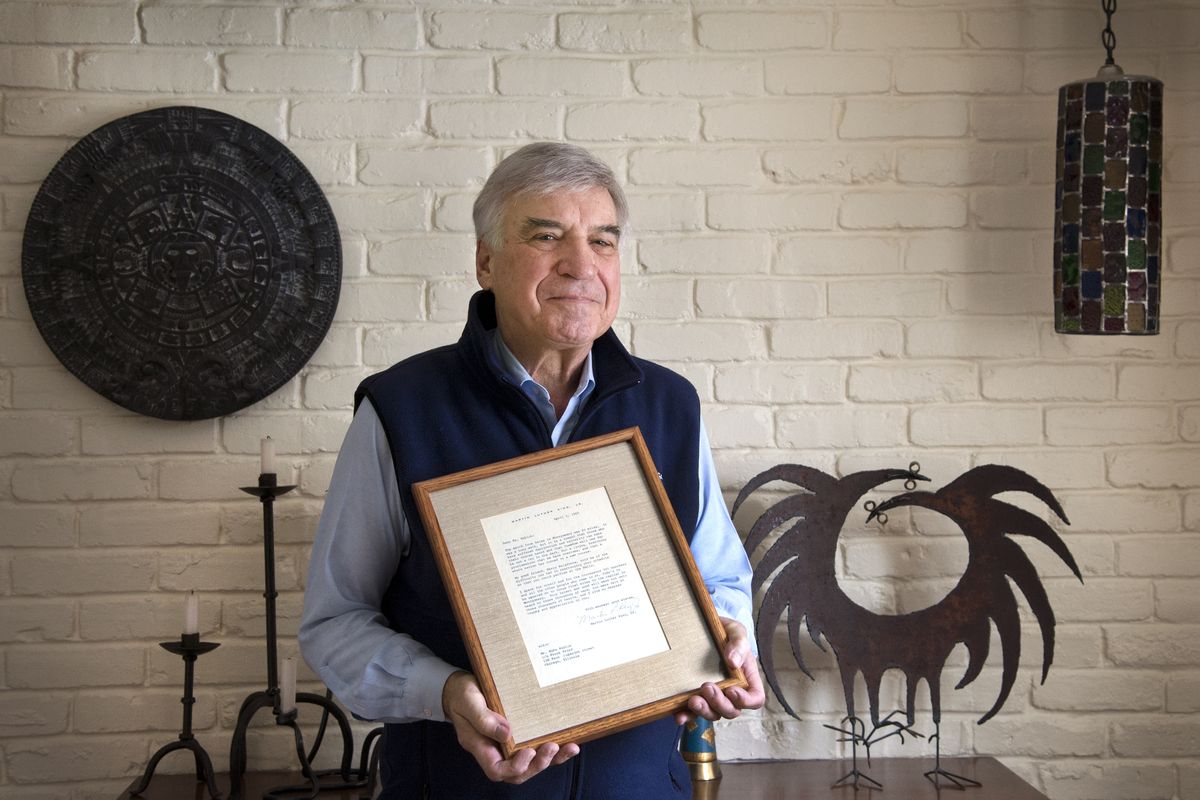This column reflects the opinion of the writer. Learn about the differences between a news story and an opinion column.
Doug Clark: King letter of thanks hangs on his wall
Mike Kobluk, a founding member of the Chad Mitchell Trio, holds a letter signed by the Rev. Martin Luther King Jr., thanking him and the band for making the effort to attend a rally celebrating the Freedom March from Selma to Montgomery, Ala. (PHOTOS BY DAN PELLE)
The treasure I’ve come to see hangs on a wall halfway down a narrow hallway inside this cozy ranch-style home on Spokane’s South Hill.
“There it is,” says Mike Kobluk, reaching to take his framed prize off its hook.
It’s a faded typewritten letter, dated April 5, 1965, and bearing a name on the letterhead that practically everyone on the planet knows.
Martin Luther King Jr.
“Want to read it?” Kobluk says.
I do and the goose bumps begin.
“Dear Mr. Kobluk,” it reads.
“The march from Selma to Montgomery was 50 miles. It was a long walk, but it is a symbol that those who have suffered deprivation and brutality can make their voices heard and that freedom will one day be not a cry in the dark, but a living, breathing, proclamation that we have overcome, and that a whole nation has turned to a new course.”
As far as keepsakes go, a letter from Martin Luther King that discusses a Selma, Alabama, march – one of the most important events in the quest for equal voting rights – would be high on the wish list of any collector.
But this correspondence is personal.
Given the recent release of the movie, “Selma,” as well as Monday being Martin Luther King Jr. Day, my host thought it would be a fitting time to share what he calls “part of Kobluk history.”
Kobluk is a founding member of the Chad Mitchell Trio, the famed folk group formed by Gonzaga University students in the late 1950s.
Known for their satirical songs and political commentary, the trio was among the performers who helped encourage and lighten the spirits of those heroes who took part in that last Alabama trek for human rights, dignity and freedom.
Two earlier marches had been thwarted by bloodshed and police. The last march succeeded, thanks to the protection of thousands of soldiers and federal officers.
“I speak for myself and for the courageous 300 marchers and all the other people who came to St. Jude’s to be spurred on to those final miles to the capital in Montgomery,” continued King in his letter.
“Your talent and good will were not only heard by those thousands of ears, but were felt in those thousands of hearts, and I give my deepest thanks and appreciation for you.
“With warmest good wishes …”
The letter ends with King’s hand-signed signature in ink.
Chad Mitchell, the Trio’s namesake, lives just blocks away from Kobluk. He, too, put his King letter in a frame and hung it on a wall. And just like his bandmate and pal, Mitchell always gets an emotional thrill from reading it.
“I’m happy I was part of it,” he says. “We were lucky that we were on the scene.”
Mitchell is being a bit modest. While luck nearly always plays a part in show business success, these guys had real-deal talent.
As far as lucky breaks go, the boost for the Chad Mitchell Trio came when the singers met Harry Belafonte during a 1959 trip to New York.
The famous entertainer signed the group to his production company and record label. The Chad Mitchell Trio was soon on its way, performing on radio and television shows with big-time acts.
“Harry was absolutely fabulous,” Kobluk says. “He was as down home as you could imagine.”
The Trio would have its share of personnel changes, including John Denver for Mitchell later in 1965.
The first change, however, came after only a year when original member Mike Pugh decided to go back to college. He was replaced by Joe Frazier, who died last year.
It was the lineup of Mitchell, Kobluk and Frazier that gladly agreed to join the entertainers Belafonte was putting together to support the marchers at their last stop outside Montgomery in late March 1965.
One memory that stands out to both Kobluk and Mitchell happened shortly after their arrival at the Alabama capital. All of the road and direction signs, they discovered, had been covered up with butcher paper in a lame attempt to confuse what locals were calling the “outside agitators.”
The trickery didn’t work, of course.
The performers made it to St. Jude’s, a Catholic complex and campground just outside Montgomery. Eventually, the marchers made their way there, too.
One website on the subject tells it this way:
“More supporters joined through the late afternoon and evening in anticipation of the march into the city. The crowd swelled to 30,000 by the end of the day, straining the limited capacity of the campsite.
“A stage had been erected, but the planned program was delayed by equipment failures that kept the camp in the dark.
“Finally, technicians coaxed a sound system to life.”
Belafonte sang one of his hits. He was followed by a string of comedians and musicians like Johnny Mathis, Leonard Bernstein, Pete Seeger and, of course, the Chad Mitchell Trio.
In his letter, King takes it to a very personal level by acknowledging some logistical gymnastics the Trio had to deal with in order to help the cause.
“My good friend, Harry Belafonte, told me of the difficulty you had in rearranging your schedule so that you could perform at the Rally,” he added.
The next day it was on to Montgomery. Despite the violence and the cruelty from bigots, King and all of those brave marchers had ignited a firestorm of change.
Four months later, on Aug. 6, 1965, President Lyndon Johnson put his signature on the Voting Rights Act.
Nearly 50 years ago. It amazes me how quickly time has blinked by.
Without going into current events, it’s also disheartening to see how far this country must go in matters of race.
Kobluk has warm memories of Selma marchers treating “us as if we were one of them,” he says. “We were all there for the purpose of being a part of it.”
King, of course, would be cut down by an assassin in 1968.
What a loss. Such a waste.
Leaving the group that same year, Kobluk would eventually find his way back to Spokane to oversee the entertainment for Expo ’74 and to later serve the city as our director of entertainment facilities.
Now 77 and retired, Kobluk says he doesn’t spend a lot of time dwelling on the past. Yet, every now and then, he’ll find himself pausing to reread that faded letter hanging on his hallway wall.
“Talk about shivers and chills,” says Kobluk. “I read that letter and, holy cow, I realize, ‘I was there!’
“It’s mind-boggling when you think about it.”



